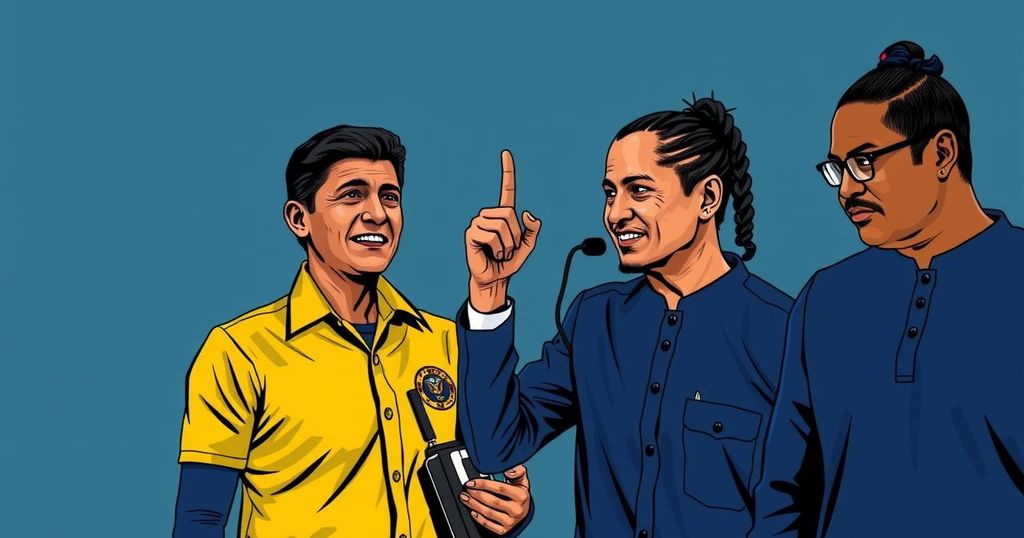Politics
ALEXIS RODRIGUEZ, ANTONY BLINKEN, BOLIVARIAN NATIONAL POLICE, BRAZIL, CHEVRON, CNN POLITICS, CORRUPTION, CUBA, DEMOCRACY, EDMUNDO GONZALEZ, FREDDY ÑAÑEZ, NATIONAL SECURITY, NORTH AMERICA, RIO DE JANEIRO, SANCTIONS, SOUTH AMERICA, TRADE RELATIONS, UNITED STATES, US, US DEPARTMENT OF THE TREASURY, VENEZUELA
Fatima Khan
0 Comments
US Sanctions Maduro-Aligned Officials to Pressure Venezuela for Democratic Transition
The United States has announced new sanctions against over 20 Venezuelan officials aligned with President Nicolas Maduro, aiming to pressure him into accepting the results of the July presidential election. Key targets include military and police officials, as the U.S. has recently recognized opposition leader Edmundo Gonzalez as the president-elect. The sanctions form part of a broader strategy to promote democracy and accountability in Venezuela, amidst a challenging political landscape.
On Wednesday, the United States implemented new individual sanctions targeting over 20 officials associated with Venezuelan President Nicolas Maduro. This action aims to exert pressure on Maduro to acknowledge the outcomes of the disputed presidential election held in July. Senior administration officials expressed confidence that these sanctions could encourage members of his government to pivot towards supporting a democratic transition in Venezuela. The sanctions affect individuals from various military and police branches, including key figures such as Maduro’s chief of staff, Anibal Coronado, and Communication Minister Freddy Ñañez.
In the context of U.S. foreign policy, these sanctions follow the recent formal recognition of Edmundo Gonzalez, an opposition leader, as the elected president following the controversial election. Secretary of State Antony Blinken emphasized the necessity of respecting the electorate’s decision, stating, “The Venezuelan people spoke resoundingly on July 28 and made Edmundo Gonzalez the president-elect. Democracy demands respect for the will of the voters.”
Moreover, the Biden administration is making these moves to reinforce democratic values in Venezuela, holding the Maduro regime accountable for actions such as political repression. As the upcoming presidential administration change looms, officials acknowledge that the new government may approach the Venezuela situation differently. The sanctions serve as a continuation of the U.S. efforts that began during the Venezuelan crisis in 2017, which already include extensive sanctions against Maduro and high-ranking officials.
The recent measures are also reflective of broader sanctions strategies, including oil sanctions, which are under review. Given that Maduro has faced accusations of drug trafficking and terrorism, U.S. prosecutors are offering substantial rewards for information regarding his arrest. Thus, the current U.S. administration remains committed to fostering democracy in Venezuela while urging compliance from its leaders.
The political landscape in Venezuela has become increasingly fraught since the onset of the crisis in 2017, characterized by hyperinflation, widespread protests, and allegations of electoral fraud. President Nicolas Maduro, who has led the country since 2013, faces significant opposition both domestically and internationally. The United States has taken a strong stance against his government, asserting that it undermines democratic values and human rights. This has led to a series of sanctions aimed at officials within the Maduro administration, particularly as rival factions emerge, desiring a transition towards a more democratic political framework. The recent elections, marred by controversy and accusations of manipulation, have only heightened tensions and prompted the U.S. to increase its pressure tactics. In current U.S. policy, balancing diplomatic engagement with sanctions remains a challenge as the political landscape in Venezuela evolves. Recognition of opposition leaders like Edmundo Gonzalez signals U.S. support for an alternative government, while ongoing sanctions aim to discourage Maduro’s repressive actions, thereby trying to restore some semblance of democracy in the nation.
In conclusion, the United States has enacted new sanctions on Maduro-aligned officials in a strategic attempt to compel the Venezuelan president to accept the electoral results from July. This initiative illustrates U.S. commitment to promoting democracy in Venezuela amidst ongoing political turmoil. As the situation develops with an impending change in U.S. administration, it remains to be seen how these sanctions and recognition efforts will impact Venezuela’s political landscape moving forward.
Original Source: www.cnn.com




Post Comment